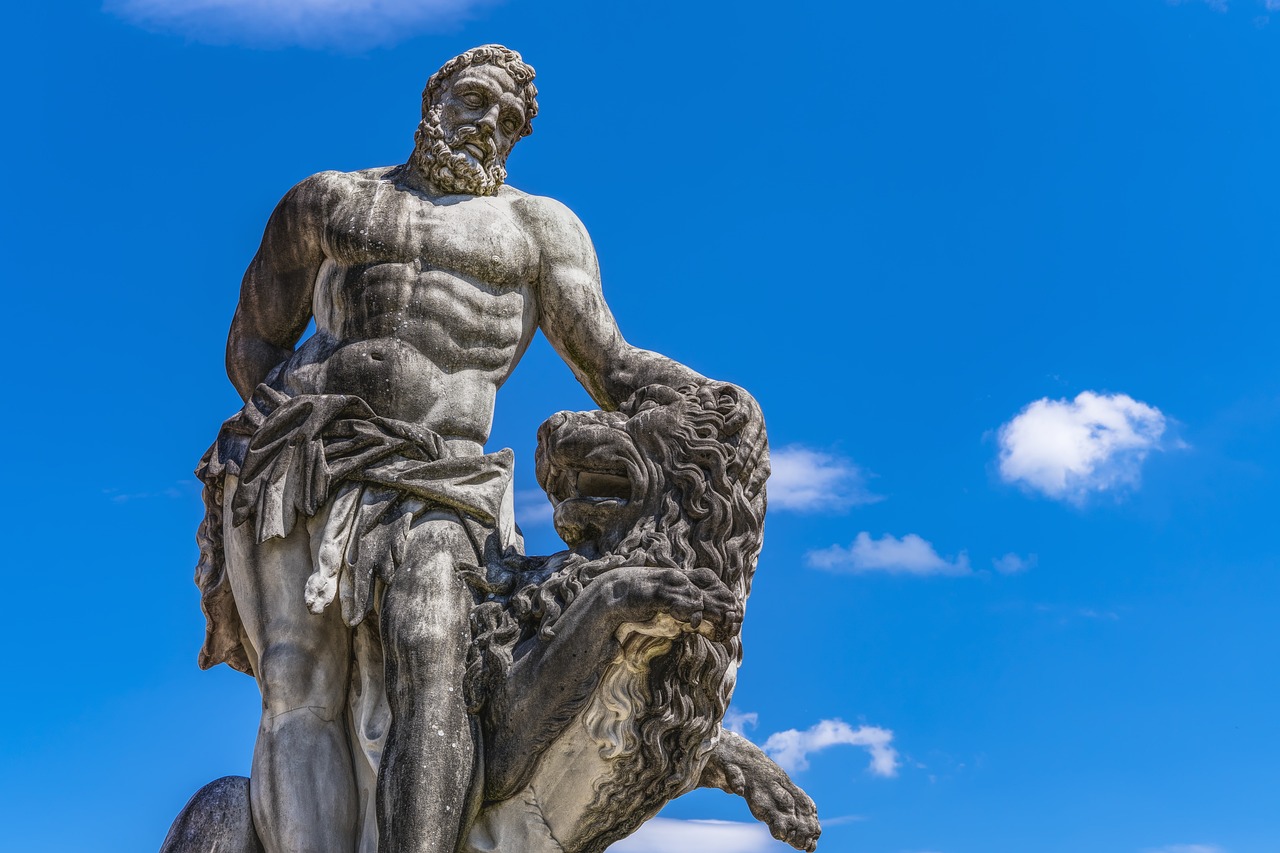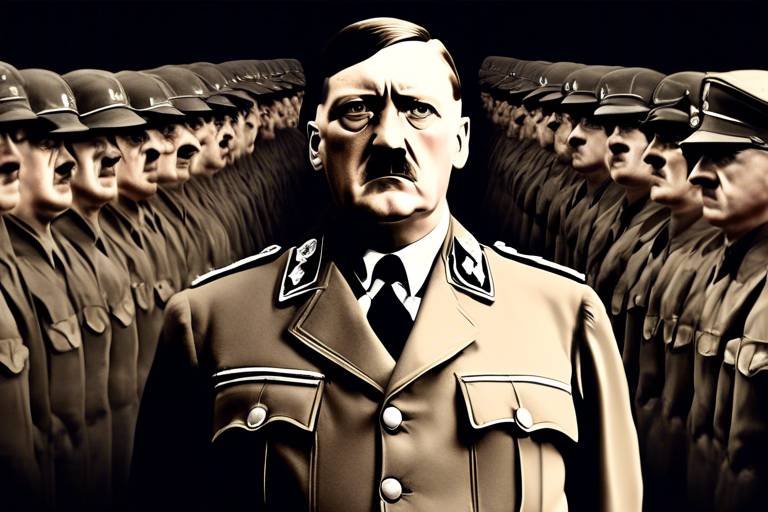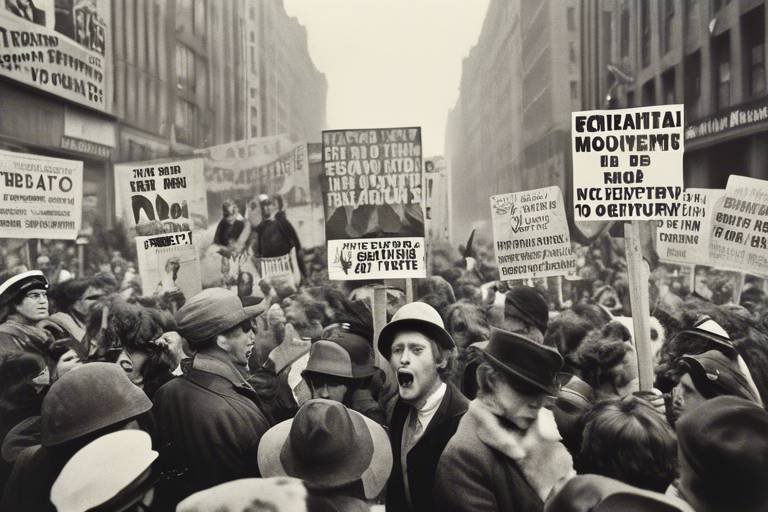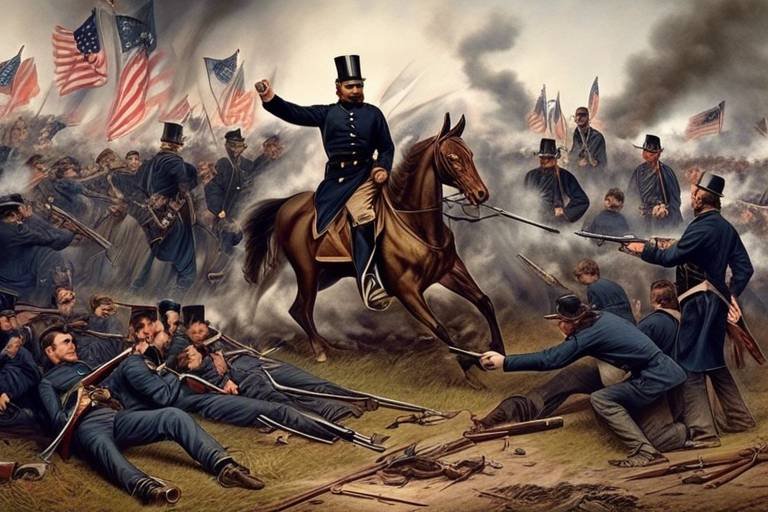The Rise of Hitler - From Soldier to Chancellor
Adolf Hitler's journey from a soldier in World War I to becoming the Chancellor of Germany is a gripping tale of ambition, power, and tragedy. Born in Austria in 1889, Hitler's early years were marked by struggles and failures, but it was his experience as a soldier during World War I that would shape his destiny. Serving in the German army, Hitler found a sense of purpose and belonging that would later fuel his political aspirations.
After the war, Hitler became involved in politics and joined the German Workers' Party, which would later evolve into the National Socialist German Workers' Party, or the Nazi Party. His charismatic leadership and powerful oratory skills quickly propelled him to the forefront of the party, where he began to espouse his radical nationalist and anti-Semitic ideologies.
One of the key events that catapulted Hitler into the national spotlight was the failed Beer Hall Putsch in 1923, a coup attempt to overthrow the government that resulted in Hitler's arrest and subsequent imprisonment. It was during his time in prison that Hitler penned his infamous manifesto, Mein Kampf, outlining his vision for a new Germany under Nazi rule.
Through strategic political maneuvering and exploiting the economic and social turmoil in Germany, Hitler rose to power and was appointed Chancellor in 1933. The Enabling Act of 1933 granted him dictatorial powers, allowing him to consolidate his authority through propaganda, intimidation, and the suppression of opposition.
Under Hitler's rule, Nazi ideology permeated every aspect of German society, promoting anti-Semitism, militarism, and totalitarianism. Discriminatory laws and policies were implemented, leading to the persecution of minorities and the erosion of civil liberties.
The impact of Hitler's leadership was catastrophic, culminating in the outbreak of World War II and the horrors of the Holocaust. Millions of lives were lost, and the world was forever changed by the atrocities committed under Hitler's regime.
The rise of Hitler from a humble soldier to the Chancellor of Germany is a cautionary tale of how unchecked power and extremist ideologies can lead to unimaginable destruction and suffering. It serves as a stark reminder of the importance of vigilance and resistance against tyranny and hatred.

Early Life and Military Service
Adolf Hitler's journey from a soldier in World War I to the Chancellor of Germany was marked by significant events and influences that shaped his rise to power. Born in Austria in 1889, Hitler's early life was characterized by struggles and ambitions that would later define his political career. His experience as a soldier during World War I played a crucial role in shaping his ideologies and fueling his desire for power.
During his military service, Hitler was deeply affected by the defeat of Germany in the war, nurturing a sense of bitterness and resentment towards the Treaty of Versailles. This resentment, coupled with his exposure to nationalist and anti-Semitic sentiments prevalent in post-war Germany, laid the foundation for his radical political beliefs.
Hitler's time in the army also provided him with a sense of purpose and belonging, instilling in him a strong sense of discipline and hierarchy that would later manifest in his leadership style. His experiences on the battlefield and interactions with fellow soldiers further solidified his nationalist fervor and aspirations for a unified and powerful Germany.
Returning to civilian life after the war, Hitler found himself drawn to the world of politics, seeking to channel his frustrations and ambitions into a larger cause. Influenced by nationalist and anti-Semitic ideologies, he soon became involved in far-right political movements, eventually finding his place in the National Socialist German Workers' Party, or the Nazi Party.
Hitler's early life and military service not only molded his political convictions but also provided him with the platform and motivation to pursue his vision of a transformed Germany. His experiences as a soldier, coupled with the turbulent socio-political landscape of post-war Germany, set the stage for his meteoric rise to power and the subsequent impact he would have on world history.

Rise to Leadership in the Nazi Party
Adolf Hitler's rise to leadership in the Nazi Party was a pivotal moment in his political career, marking the beginning of his journey towards becoming the Chancellor of Germany. As a passionate and persuasive orator, Hitler played a crucial role in the formation and expansion of the National Socialist German Workers' Party, more commonly known as the Nazi Party. His ability to captivate audiences with his fiery speeches and nationalist rhetoric quickly garnered him a loyal following, propelling him to a position of influence within the party.
Hitler's leadership style was characterized by his charismatic persona and authoritarian tendencies, which resonated with many disillusioned Germans during a time of economic hardship and political instability. Through a combination of propaganda tactics, including the use of mass rallies and carefully crafted messaging, Hitler was able to cultivate a strong sense of loyalty and devotion among party members and supporters.
One of the key turning points in Hitler's rise to power within the Nazi Party was the failed Beer Hall Putsch of 1923. This botched coup attempt, aimed at overthrowing the Weimar government, resulted in Hitler's arrest and subsequent trial. Despite the setback, Hitler used his time in prison to reflect on his political strategy and articulate his vision for Germany in his manifesto, Mein Kampf.
Following his release from prison, Hitler continued to solidify his position within the Nazi Party, eventually assuming the role of party leader. His unwavering determination, coupled with his ability to exploit the social and political turmoil of the time, allowed him to ascend to the highest echelons of power in Germany.

Beer Hall Putsch and Imprisonment
The Beer Hall Putsch was a significant event in Adolf Hitler's political career, marking a pivotal moment in his rise to power. In November 1923, Hitler and his supporters attempted to overthrow the Weimar Republic government in Munich, Germany. The coup, however, failed to gain widespread support and was quickly suppressed by the authorities.
As a result of the failed coup, Hitler was arrested and charged with treason. During his trial, he used the platform to gain national attention and promote his nationalist and anti-Semitic ideologies. Despite being found guilty, Hitler received a relatively light sentence and served only nine months of his five-year prison term.
While in prison, Hitler wrote his infamous manifesto, Mein Kampf, outlining his political beliefs, goals, and vision for Germany's future. The book became a foundational text for the Nazi Party and solidified Hitler's position as its leader.
Hitler's time in prison allowed him to reflect on his strategies and refine his political tactics. He realized the limitations of attempting to seize power through force and violence, shifting his focus to legal and political means of achieving his goals.
Overall, the Beer Hall Putsch and Hitler's subsequent imprisonment played a crucial role in shaping his political trajectory. It elevated his status as a nationalist leader, provided him with a platform to spread his ideology, and set the stage for his eventual ascent to the Chancellorship of Germany.

Path to Chancellorship
Adolf Hitler's path to Chancellorship in Germany was marked by a series of strategic political moves and the exploitation of the country's fragile economic and social conditions. As the leader of the National Socialist German Workers' Party (Nazi Party), Hitler capitalized on the widespread discontent and disillusionment among the German population in the aftermath of World War I. His ability to tap into the nationalistic sentiments and offer a vision of a strong and prosperous Germany resonated with many who felt betrayed by the Treaty of Versailles.
Hitler's rise to power was not solely based on popular support but also on his astute political maneuvering. By forming alliances with influential industrialists, military leaders, and conservative politicians, Hitler was able to gain the necessary backing to position himself as a legitimate candidate for Chancellor. His promise to restore Germany's former glory and address the economic hardships facing the country struck a chord with a significant portion of the electorate.
Furthermore, the fractured nature of the Weimar Republic's political landscape worked in Hitler's favor, allowing him to exploit the weaknesses of the democratic system. Through a combination of aggressive propaganda campaigns, targeted messaging, and the effective use of mass rallies, Hitler was able to consolidate his support base and present himself as the strong leader that Germany needed in a time of crisis.
As the Great Depression deepened and political instability grew, Hitler's message of national unity and authoritarian leadership gained traction among those seeking stability and certainty. The Reichstag fire in 1933 provided the pretext for Hitler to push through the Enabling Act, granting him sweeping powers to bypass the democratic process and establish a dictatorship.
Hitler's path to Chancellorship was paved with manipulation, opportunism, and the exploitation of a nation in turmoil. By capitalizing on the prevailing discontent and offering a vision of a renewed Germany, Hitler was able to ascend to the highest office in the country, setting the stage for one of the darkest chapters in human history.

Enabling Act and Consolidation of Power
The Enabling Act of 1933 was a pivotal moment in Adolf Hitler's consolidation of power in Germany. This act effectively gave Hitler the authority to enact laws without the consent of the Reichstag, Germany's parliament, essentially granting him dictatorial powers. With the Enabling Act in place, Hitler was able to bypass democratic processes and implement his agenda swiftly and decisively. This marked a significant shift towards authoritarian rule in Germany, as Hitler used this newfound authority to solidify his control over the government and suppress any opposition.
Through the Enabling Act, Hitler was able to centralize power in his hands, allowing him to make unilateral decisions that shaped the course of the country. This consolidation of power enabled Hitler to further his agenda of Nazification, imposing Nazi ideology on all aspects of German society. The Act effectively dismantled the remaining checks and balances in the government, paving the way for Hitler to establish a totalitarian regime.
Propaganda played a crucial role in legitimizing Hitler's authority under the Enabling Act. The regime used propaganda to manipulate public opinion, portraying Hitler as a strong and visionary leader who was capable of leading Germany to greatness. Through a combination of propaganda, intimidation, and suppression of dissent, Hitler was able to maintain a tight grip on power and ensure compliance with his policies.
The Enabling Act not only consolidated Hitler's power domestically but also set the stage for further aggression on the international front. With his authority firmly established, Hitler pursued an expansionist foreign policy that eventually led to the outbreak of World War II. The Act was a critical step in Hitler's march towards totalitarian control, marking a dark chapter in German history that would have far-reaching consequences.

Nazi Ideology and Policies
Nazi ideology under Adolf Hitler's regime was characterized by a combination of extreme nationalism, racism, and authoritarianism. The core tenets of Nazi ideology included the belief in the superiority of the Aryan race, anti-Semitism, and the need for territorial expansion to achieve Lebensraum, or living space for the German people.
Hitler's policies aimed at creating a totalitarian state where the government had complete control over all aspects of society. This included strict censorship of media, suppression of political opposition, and the establishment of a secret police force, the Gestapo, to enforce compliance with Nazi ideology.
One of the most infamous aspects of Nazi ideology was its implementation of discriminatory laws targeting minorities, particularly Jews. The Nuremberg Laws of 1935 stripped German Jews of their citizenship and imposed severe restrictions on their rights, leading to widespread persecution and eventual genocide during the Holocaust.
For the Frequently Asked Questions (FAQ) section, you can add the following HTML structure at the end of the article:-
What were the main factors that contributed to Hitler's rise to power?
Hitler's rise to power was facilitated by a combination of economic instability, political turmoil, and his own charisma and propaganda skills. The aftermath of World War I and the Great Depression created a fertile ground for his message of nationalism and anti-Semitism to resonate with the German population.
-
How did Hitler maintain control over Germany once in power?
Hitler maintained control through a combination of propaganda, intimidation, and suppression of dissent. The Enabling Act of 1933 granted him dictatorial powers, allowing him to bypass the Reichstag and govern by decree. The Gestapo and SS were used to eliminate political opponents and enforce loyalty to the Nazi regime.
-
What were the long-term consequences of Hitler's rule?
Hitler's rule led to the outbreak of World War II, the devastation of Europe, and the Holocaust, in which six million Jews were systematically murdered. The legacy of his regime continues to shape the world today, serving as a stark reminder of the dangers of totalitarianism and unchecked power.

Impact of Hitler's Rule
Adolf Hitler's rule had a profound and devastating impact on Germany and the world at large. His leadership was characterized by extreme authoritarianism, militarism, and the implementation of discriminatory policies that targeted minority groups, particularly the Jewish population. Under Hitler's regime, the systematic persecution and extermination of millions of Jews and other marginalized communities took place, culminating in the horrific events of the Holocaust.
Furthermore, Hitler's aggressive expansionist policies and pursuit of territorial conquests led to the outbreak of World War II, resulting in widespread destruction, loss of life, and suffering on a global scale. The conflict engulfed numerous countries and brought about immense human tragedy, reshaping the geopolitical landscape for years to come.
In addition to the catastrophic consequences of war and genocide, Hitler's rule also had long-lasting effects on the social fabric of German society. The propagation of Nazi ideology promoted a culture of fear, intolerance, and conformity, stifling dissent and undermining democratic principles. The pervasive propaganda machine employed by the regime manipulated public opinion, fostering a climate of hatred and division.
Moreover, the economic policies implemented under Hitler's rule, such as rearmament and autarky, prioritized military expansion over the well-being of the population, leading to widespread poverty, deprivation, and hardship for many ordinary Germans. The centralized control exerted by the Nazi regime extended to all aspects of life, exerting a suffocating grip on individual freedoms and liberties.
The legacy of Hitler's rule continues to reverberate in contemporary discourse, serving as a stark reminder of the dangers of unchecked power, extremist ideologies, and the consequences of apathy and complicity. The lessons learned from this dark chapter in history underscore the importance of vigilance, tolerance, and the defense of democratic values in the face of tyranny and oppression.
Frequently Asked Questions
- What role did Hitler play in World War I?
Hitler served as a soldier in World War I, where he developed a strong sense of nationalism and anti-Semitic beliefs that would later shape his political career.
- How did Hitler rise to power in Germany?
Hitler rose to power through strategic political maneuvering, exploiting the economic and social turmoil in Germany to gain support and eventually become Chancellor in 1933.
- What was the Beer Hall Putsch?
The Beer Hall Putsch was a failed coup attempt by Hitler and the Nazis in 1923, leading to Hitler's imprisonment where he wrote his infamous manifesto, Mein Kampf.
- What were the core tenets of Nazi ideology?
Nazi ideology included anti-Semitism, militarism, and totalitarianism, leading to the implementation of discriminatory laws and policies under Hitler's regime.
- What were the consequences of Hitler's rule?
Hitler's leadership resulted in the persecution of minorities, the outbreak of World War II, and the horrific atrocities of the Holocaust, leaving a dark mark on history.



















